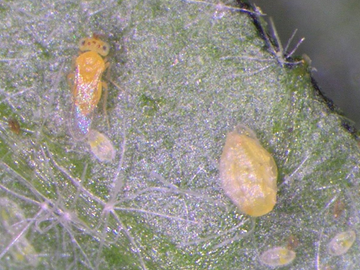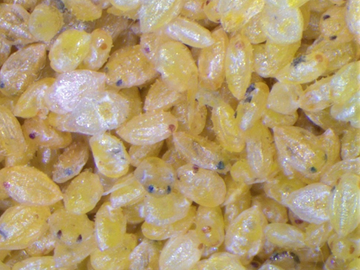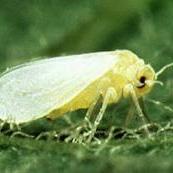New product: Eretmocerus hayati for silverleaf whitefly control in horticultural crops and cotton
Monday, September 27, 2021
Silverleaf whitefly has traditionally been a pest in tropical and subtropical climate zones. However, it is on the move and is fast becoming an issue for growers in other areas as it marches down into Australia’s southern states.
The pest reduces yield and profits by causing leaf stunting, discolouration (silvering), and sooty mould. It can also transmit viruses, affecting future harvests and the productive life of the crop. Silverleaf whitefly is difficult to control with chemicals alone and is already resistant to some chemical groups. Integrated Pest Management, including the release of wasp parasites, is the most sustainable way of suppressing this pest.
Increased interest for good quality and a reliable supply of Eretmocerus hayati from growers of cotton and melons in particular, has encouraged Biological Services to now produce this parasite. These tiny parasitic wasps are effective in many crops, including cotton, vegetables, melon, grain legume and ornamental crops. Silverleaf whitefly reproduce and feed on more than 600 plant species.
“When we were approached by growers asking for extra supply of this product for their crops, we were happy to oblige,” said Western Australia-based co-Director of Biological Services, Lachlan Chilman.
“In autumn, we collected the wasps from field sites in the NT and WA and now have a strong culture ready for supply to growers throughout Australia. Two key species were found. E. hayati that has been introduced and reared for release for some years, and E. mundus, a naturally occurring species prevalent in the hot/dry tropics. Whilst we intend to focus mostly on E. hayati production, but we are keeping a colony of E. mundus for these areas as well. The feedback we’ve had from the growers who are trialling our products is very positive.
“We are proud of our reputation for quality. Our products must meet our own stringent quality standards or we will not supply them,” Lachlan said.


Image 1. E. hayati adult (left) about to lay an egg in a Silverleaf whitefly nymph. Parasitised whitefly (right). Image 2. E. hayati pupae.
Over the past 50 years, Biological Services has built a rock-solid reputation for quality. Our beneficial products are supplied clean and without contamination. Our logistics people work hard to ensure our products arrive in good condition and they are backed by a qualified team of entomologists and horticulturalists who advise growers on how to manage pests on their sites.
Silverleaf whitefly can increase rapidly so E. hayati work best if they are released preventatively before whitefly are established or when the very first adult whiteflies are detected. If the whitefly population is already high, we can recommend a program of non-disruptive insecticides to reduce the pest levels in the crops, while continuing to release the parasites. The addition of E. hayati to our product list compliments other Biological Services products for whitefly control including Eretmocerus warrae, Encarsia formosa, Nesidiocoris tenuis, Typhlodromalus lailae and Typhlodromips montdorensis, as well as our range of sticky rolls and traps.
To order, learn more about controlling Silverleaf whitefly in your crop, or to arrange an on-farm consultation, call your Biological Services Consultant or our head office on 08 8584 6977 or info@biologicalservices.com.au.





